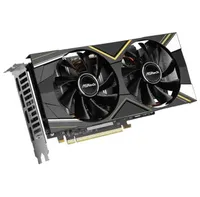Newegg is selling an old but unused RX 5600 XT GPU for $109 — it's super cheap, and here's how it stacks up in 2024
Two generations old but in mint condition, for a bit more than a Benjamin.
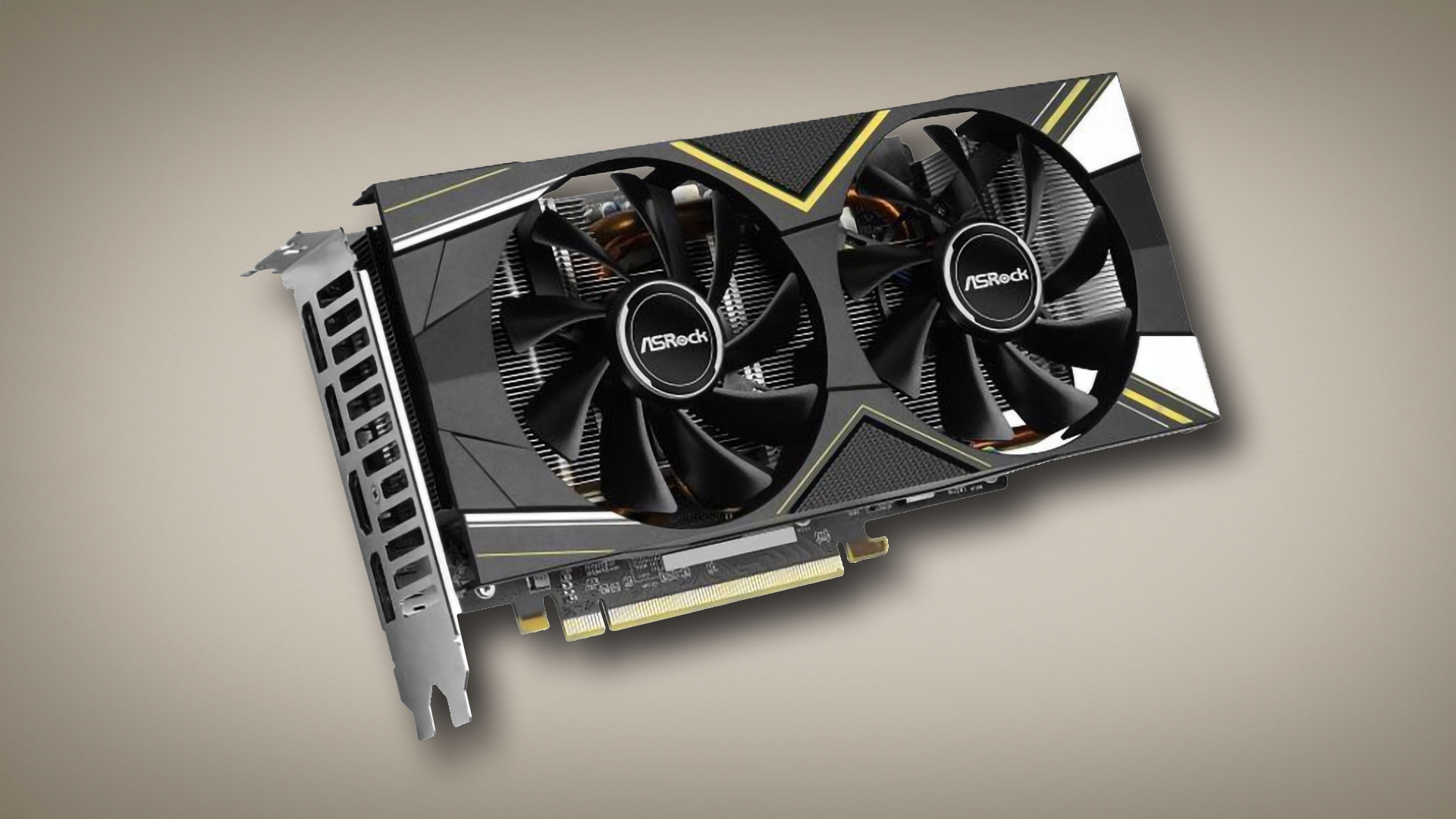
Sometimes the best graphics card isn't the fastest or newest model — it's the lowest priced card you can find that's still relatively recent. Such is the case with the ASRock RX 5600 currently listed on Newegg for $109.99. Don't be fooled by the listing showing up in February 2024, this is a GPU that originally launched back in January 2020. You can check our Radeon RX 5600 XT review for the details at the time, but if you're after a cheap GPU, you're probably more interested in how the card stacks up today.
Let's start by saying that there are some potential question marks. The Newegg page says this is an RX 5600, but then the specs on that same page show RX 5600 XT figures. The RX 5600 was an OEM-only part, so it makes more sense for this to be an RX 5600 XT, and at least the listing says it has 2304 shader cores and 14Gbps GDDR6 memory — the vanilla RX 5600 would have 2048 shaders and 12Gbps memory, so it would be about 10~15 percent slower. Also, ASRock doesn't even make an RX 5600, so this is undoubtedly the RX 5600 XT Challenger D OC.
You should also keep in mind what you're not getting with an AMD GPU series that originally debuted in mid-2019. The RDNA architecture may have been a big step forward from the previous Vega and Polaris GPUs, but it's missing some modern features. There's no ray tracing support, nor are there any dedicated AI acceleration features. Video codec support is limited to HEVC H.265 or AVC H.264, meaning there's no AV1 encoding support. Power use will also be significantly higher than equivalent performance current-gen cards.
ASRock RX 5600 XT Challenger D OC for $109.99
Game on like it's 2020 with this budget-priced RX 5600 XT. It cost $279 at launch, and it offers a tremendous value at this clearance price.
But damn is it cheap! And for an ostensibly new card, so you don't have to worry whether it was crunching away on Ethereum mining for a few years. So let's look at how the card stacks up to a few modern GPUs, using data from our GPU benchmarks hierarchy.
We've got the similarly priced Arc A380 and the more expensive Arc A580. From AMD, we have the newer but more expensive RX 6400 and RX 6500 XT, plus the step-up RX 6600 that basically replaced the 5600 XT. From Nvidia... well, there's nothing really directly comparable in pricing, but let's toss in the GTX 1650 and GTX 1650 Super, GTX 1660 Super, and the RTX 2060 — the latter being the direct competitor for the RX 5600 XT back in the day.
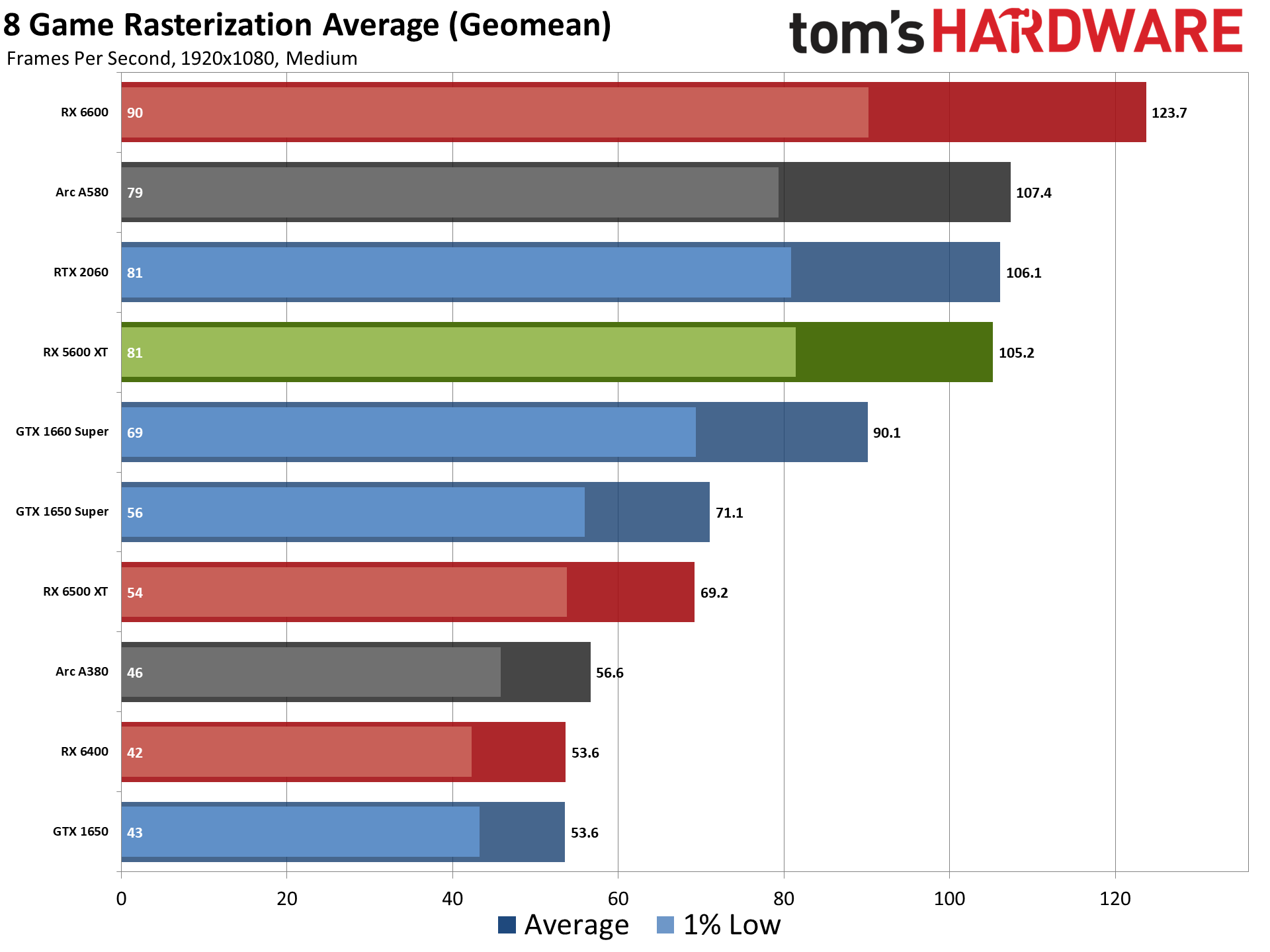
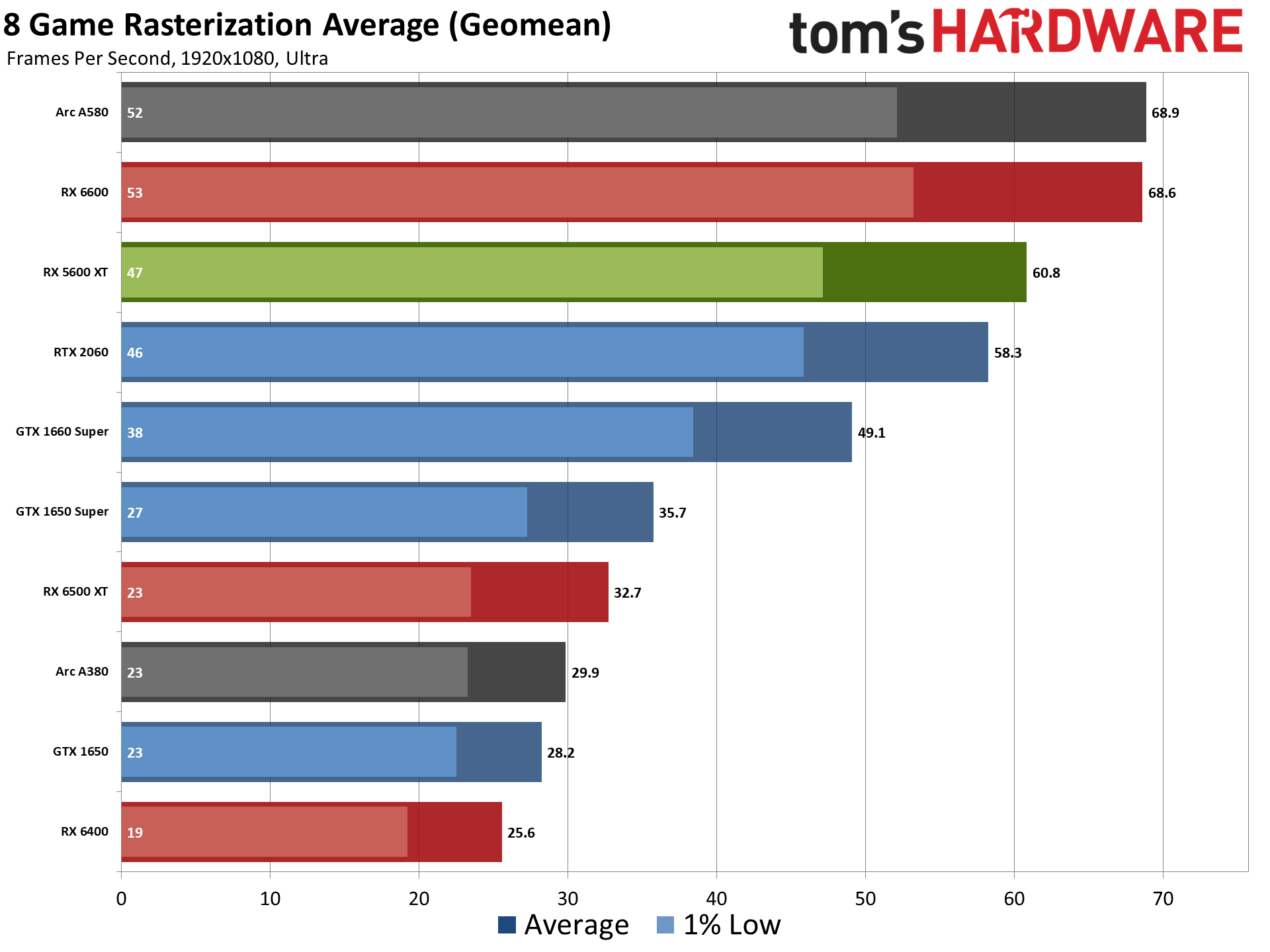
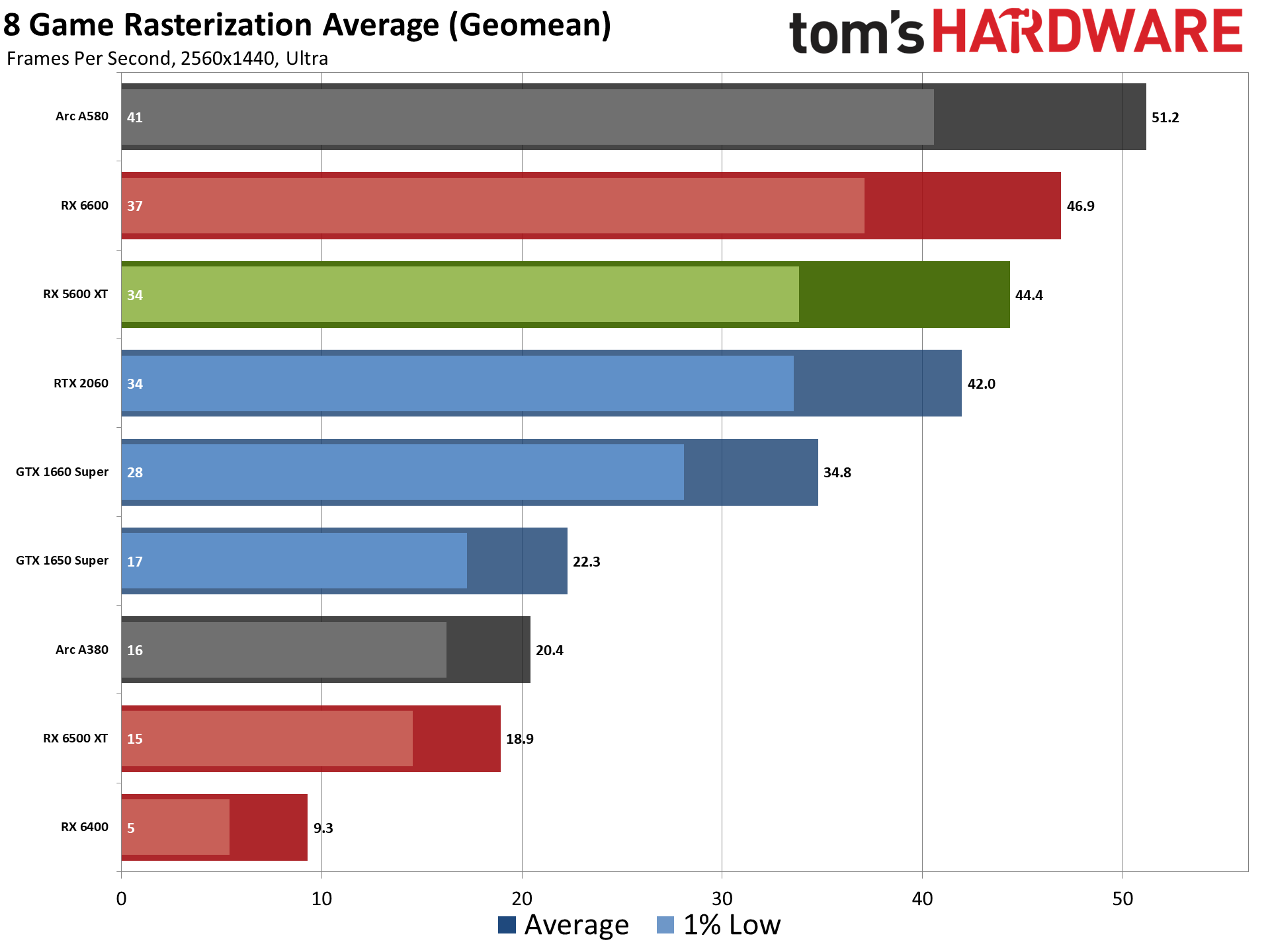
Honestly, performance isn't bad at all — quite the contrary. The RX 5600 XT isn't going to handle the latest releases at maxed out settings and high resolutions, but for medium/high settings at 1080p it competes quite favorably against the newer budget offerings. Specifically, it's about double the performance of the GTX 1650, RX 6400, and Arc A380, with a price that's currently less than any of those.
Of course, average power use while gaming will be about double that of the RX 6400 and Arc A380 as well. If you're worried about electricity costs adding up, keep in mind that 75W of extra power for four hours per day works out to around 9 kWh per month. Depending on how much you pay for electricity, that may or may not be a serious worry — and four hours per day would be quite a lot for most households.
There are newer and faster GPUs for sure, but even with the lack of ray tracing support — it's not like you're going to be playing Cyberpunk 2077 with all the bells and whistles on anything priced below $300 anyway — the RX 5600 XT still holds up decently well. It's absolutely a budget offering now, but if you're just looking for a cheap card to tide you over at 1080p medium until the next generation cards arrive in 2025, you could do far worse.
Get Tom's Hardware's best news and in-depth reviews, straight to your inbox.

Jarred Walton is a senior editor at Tom's Hardware focusing on everything GPU. He has been working as a tech journalist since 2004, writing for AnandTech, Maximum PC, and PC Gamer. From the first S3 Virge '3D decelerators' to today's GPUs, Jarred keeps up with all the latest graphics trends and is the one to ask about game performance.
-
ezst036 ReplyAdmin said:so you don't have to worry whether it was crunching away on Ethereum mining for a few years.
I've ordered cards from Ebay before that I know had been used for mining (because of the custom BIOS that ws present once received) or it was honestly/explicitly stated in the listings.
Never had a problem with any of the former mining cards. They all played games just fine despite having been worked hard. For those cards with a custom BIOS, it was just one flash away from stock and again, the cards functioned as expected. -
Geef My old video card was a 5700 XT and it ran 1440p fine at 60 or so on most older games. I had to set some settings lower to handle it but it worked out and looked good. A 5600XT should be ok at 1440p 60 if you set everything to low.Reply
Also for such a low cost card you can try mega-overclocking it and see if it might just do a little more. -
King_V Edit: I think I'm more or less repeating what Jarred said in the article. That's what I get for reading only two or three lines in, then posting. mea culpa 🤦🏻♂️Reply
It's (probably) not really an RX 5600 XT. It's another of the RX 5600 OEM (non-XT) models. The product title:
ASRock Challenger Radeon RX 5600 6GB GDDR6 PCI Express 4.0 x16 Video Card RX5600 CLD 6G
Note that it doesn't say XT in there. So, if I'm right, then the specs are partly wrong. It does not have 2304 Stream Processors, and is not a 150W card, despite what NewEgg says, but instead 2048 Stream Processors, and about 125W.
A similar thing happened with both the 2-fan and 3-fan Phantom Gaming variants of this, which I went into for a bit in this thread.
I mean, is it POSSIBLE that it's actually a 5600 XT? Maybe. But, judging by the other two where the product description does not include "XT", this is probably also the OEM version, and the Stream Processors spec is wrong.
BUT . . absolutely, still the best performing card you can get new with a full 3-year warranty at this price point. It's cheaper than any new GTX 1660Ti, 1660 super, 1660, or 1650, or than any RX 5500 XT, 6400 or 6500 XT, and outperforms them all. -
ohio_buckeye If it’s the 5600xt, I had one of those for a bit last year before picking up a 6800xt on a sale. Not a bad card at all for a budget. For that money I’d say if someone is running an old or low end gpu, get it for that money.Reply -
Pierce2623 For $110 bucks that level of power with 6GB on a 192 bit bus is an absolutely smoking deal. That’s about 15-20% better performance than a 3050 8GB at half the price. Or it’s like 30-40% faster than a 3050 6GB for only 60% of the price. Then, even compared to a rx6600/xt, it’s still more performance per dollar.Reply -
JarredWaltonGPU Reply
Only way to know for sure would be to buy it, but ASRock doesn't list any RX 5600 cards on its site. That doesn't prove it's an XT, but the specs on Newegg are also identical to the ASRock 5600 XT specs. Then again, we also have this whopper of a product image:King_V said:Edit: I think I'm more or less repeating what Jarred said in the article. That's what I get for reading only two or three lines in, then posting. mea culpa 🤦🏻♂️
It's (probably) not really an RX 5600 XT. It's another of the RX 5600 OEM (non-XT) models. The product title:
Note that it doesn't say XT in there. So, if I'm right, then the specs are partly wrong. It does not have 2304 Stream Processors, and is not a 150W card, despite what NewEgg says, but instead 2048 Stream Processors, and about 125W.
A similar thing happened with both the 2-fan and 3-fan Phantom Gaming variants of this, which I went into for a bit in this thread.
I mean, is it POSSIBLE that it's actually a 5600 XT? Maybe. But, judging by the other two where the product description does not include "XT", this is probably also the OEM version, and the Stream Processors spec is wrong.
BUT . . absolutely, still the best performing card you can get new with a full 3-year warranty at this price point. It's cheaper than any new GTX 1660Ti, 1660 super, 1660, or 1650, or than any RX 5500 XT, 6400 or 6500 XT, and outperforms them all.
318RX 6000 series! Amazing. :D -
King_V Welp, I posted this card in Reddit under r/buildapcsales, with the thread being here.Reply
While this would easily be worth it even if it had the cut-down RX 5600 OEM chip, if you scroll down and look for posts by a user called Cap-_-merica, they've posted screenshots, as well as some info from the box, that seem to indicate that this is a full blown 5600 XT. I'm hoping that was the case for the whole batch, rather than just a few people getting lucky.
Edit: to clarify, the box info suggests 5600 OEM, but the GPU-Z shows 5600 XT.
